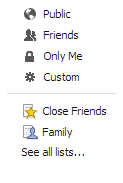Social media and online privacy and…
9 minute read
October 19, 2013, 6:12 PM
Those of you who have seen me online know that I really get into social media. I do Facebook, I do the Twitter, I do Instagram, and I also do Reddit. And in doing social media, I’ve noticed a few recurring trends, and it begs discussing…
Tell me this hasn’t happened to you before: you’re going down your news feed, and you see a status from a Facebook friend. It says something along the lines of this:
I’m cleaning out my friends list, so if you didn’t make the cut, it’s been nice knowing you.
I’m cleaning my Facebook friends. Let me know if you want to stay.
I find these messages amazingly annoying. Especially when, without fail, people make a zillion replies beneath that say something to the tune of, “Don’t delete me!” followed by reassurances from the original poster that certain people are “safe” from their defriending spree. I personally think it says something about a person’s self-esteem when they feel that they need to post such a self-centered message and then watch people glom onto them like that. It reminds me of the way that Chuck E. Cheese distributes free tickets to kids during the live shows. There, Chuck just grabs up a handful of tickets in his hands (paws?) and throws them up in the air in the direction of the audience. The kids then all then rush the character to grab as many free tickets as they can get their hands on. It seems a bit demeaning for the kids who rush the character going after free tickets, and this seems on the same level, with a little bit of groveling involved on top of it all. In any case, it’s a message I could definitely live without.
And then of course, the visibility on these kinds of posts is usually set to where only the person’s Facebook friends can see it, so all that the people who are affected ever see is this:
![]()
All someone who is affected can see is that they’ve been defriended, and they have no idea why. Thanks, love you, too. The person doesn’t know whether it was something that they said or did that turned the person off, or whether it is something completely unrelated to them, and they were affected by a change like that. You have no way of knowing, but poof – you’re gone, without any explanation. I believe that if I’m going to be defriended by someone, I deserve an explanation. Facebook allows you to select a predetermined reason for reporting content, including a few very ambiguous ones like, “This person is annoying,” and “This timeline is full of inappropriate content.” The way I figure, even if the removal reason is clearly canned, it’s better than nothing at all, so at least I know where I stand. These options would probably suffice:
- “I have found some of your comments to be offensive to my taste.”
- “I don’t find the things that you post to be interesting.”
- “I believe that we have drifted apart and it’s time for us all to move on.”
- “I am cleaning out my friends list – nothing personal.”
- “Eat s— and die.”
And yes, I included that last one as a joke. Still, I think that we deserve an explanation. One time I got an explanation for why I was being defriended (and blocked) by someone. That was after they posted about Obamacare, then pending approval in Congress. I posted an anonymized version of the conversation with annotations on Schumin Web. That person sent me this short message about how people are allowed to have differences of opinion, and then blocked me. I wasn’t too concerned, though, and it was totally worth it.
My personal policy when it comes to defriending is that I do it very rarely. Facebook has controls that can increase and decrease the amount of activity that it shows me about people, and I’ve had to “turn down” a few people in the past. But a defriending is really rare. Usually, in the rare case where I am driven to defriend someone, I will block them outright. If I block someone, that usually falls into the category of, “I never want to see you again,” and “Consider this bridge burned.” About the only time I can think of where I just defriended someone without a block is a case in March 2010 where someone I used to go to church with continually made really racist comments on my Facebook posts. I had enough, and defriended her. Whenever Mom occasionally brings this person up when we talk, I always am quick to mention, “You mean the racist?” I have very little tolerance for racism. If she had continued, I probably would have blocked her.
But if someone gets defriended due to a friends list purge and the target of the defriending notices and sends a new friend request, then I believe that it is rude to not accept it. I’m willing to brush the incident off if the person accepts the new friend request. All is well again in that case. But to not accept without any explanation is just rude. Nice knowing you, ya know? There needs to be more communication sometimes, because it’s not like in cartoons where you can just drop an anvil on someone’s head and be done with it.
Of course, on the subject of people who put valuations on their friends, I love the people who try to guilt you into posting things. You’ve seen these before. Things like, “Like if you love Jesus. Ignore if you love Satan,” or “Share this to support this poor child.” Give me a break. At the time that I’m writing this, the guilt-du-jour that’s making the rounds goes like this:
No one reads my wall. So this should be a short experiment. This is a game to see who reads my wall and who just scrolls. So, if you read this, leave a one word comment on how we met. Only one word, then share this to your wall so I can leave you a word comment. Please don’t add your word and then not bother to share!
I refuse to participate in these sort of things on principle. I’ve never understood the point of guilting your friends into taking actions on social media for inconsequential things. This particular one, I found pretty annoying, and made a response to it:
If I see one more of those stupid “no one reads my wall, so post where we met and then share this message” posts, I swear I am going to scream.
I think we all have thought this about these sorts of posts at some time or other. And true to form (for my friends), someone called my bluff. So I posted this in response:
No one can say that I am not a man of my word. I said I would scream if I saw it again, and so I did (or at least posed for a photo that looks like I was screaming – no neighbors were disturbed in the creation of this picture).
And then people take a very strange view of privacy on Facebook and on the Internet in general. They realize that anything can be downloaded and reposted. But they don’t have a good grasp on user agreements, intellectual property, and what these things mean. Thus the rise of this:
Warning – any person and/or institution and/or Agent and/or Agency of any governmental structure including but not limited to the United States Federal Government also using or monitoring/using this website or any of its associated websites, you do NOT have my permission to utilize any of my profile information nor any of the content contained herein including, but not limited to my photos, and/or the comments made about my photos or any other “picture” art posted on my profile. You are hereby notified that you are strictly prohibited from disclosing, copying, distributing, disseminating, or taking any other action against me with regard to this profile and the contents herein. The foregoing prohibitions also apply to your employee, agent, student or any personnel under your direction or control.
The contents of this profile are private and legally privileged and confidential information, and the violation of my personal privacy is punishable by law.
UCC 1-103 1-308 ALL RIGHTS RESERVED WITHOUT PREJUDICE.
I find these things very amusing. Snopes has thoroughly debunked it, and it’s kind of ridiculous on its face. The only notice that means anything is the user agreement for the various websites that you signed up for.
The thing about the Internet and privacy is this: if you post it on the Internet, it is by definition not private. If you post it to a social media site, it is most definitely not private, because those things are specifically intended for sharing. If you want something to be kept private, don’t post it online – simple as that. If you post it online, you are putting something out in public view, no matter what your “privacy” settings are for your content. I hate to tell you this, but it’s not private. Additionally, once something is out on the Internet, it is out there for good. Permanently. Even after you delete the original source. It exists out there somewhere. And very often, people are putting their names on it. So don’t be surprised if your parents, spouse, principal, boss, or otherwise finds a picture of you in a compromising position that you posted. It’s not a violation of anyone’s privacy if someone views a photo that you posted online. Thus why I especially love the part that says, “[…]or taking any other action against me with regard to this profile and the contents herein.” Translated, even though you saw this photo of me doing [insert compromising activity here] on my Facebook profile, you can’t fire me for this because I posted this cute little notice that I found online. And the line to buy shares in the upcoming IPO for the 14th Street Bridge forms to the left.
I think part of the problems with people and privacy on the Internet is that we overuse the word to the point where it loses much of its meaning. Every website these days (even this one) has a privacy statement that nobody reads. We talk about online privacy like it means something. We talk about privacy in general like it means something. I personally love it when people complain that being photographed in a public place is a violation of their privacy. Is this photo a violation of someone’s privacy? What about this photo? Or this photo? The answer is a resounding “no” in all cases. There is no expectation of privacy when you are out in a public place. The only place where one should expect privacy is where one would reasonably expect it, like at one’s home, a changing room, a restroom, etc. If someone is spying on you while you’re on the pot, or watching you in your home, then that’s a legitimate violation of one’s privacy. A photograph on the street does not constitute a violation of your privacy. And likewise, the Internet is a public venue.
On Facebook, there are various “privacy” levels for posts:

These sorts of things aren’t really controls on privacy. Regardless of what you think that your “privacy” settings are, you are posting to the world’s largest graffiti wall, and there is the potential for anyone to see it. I will blame the social media providers for this one, in that they use a term that is really a misnomer in this case. I believe the technical term for such settings is “permissions”, and the better “explain like I’m five” term for it is “visibility”. Since ultimately, you’re still posting to a site that is very much viewed by the public. What you’re doing is telling the site who it may show your content to. But that’s not stopping anyone from reposting, with or without your name and pic removed, like this:

See what I just did? Screen-grabbed it, and pow – it’s now visible for all to see, outside Facebook. Thus another thing: the settings for “privacy” that you set on a social network only apply to the social network site itself, and what it is programmed to do. Humans are an entirely separate matter, and they will do as they please, whether or not it coincides with what you want or not.
For that matter, it is also not a violation of someone’s privacy to attribute them by name and face when criticizing them (which I’ve done). Just make sure that the information that you are attributing to them is 100% accurate, or you might get yourself in trouble for other things like libel, but you won’t get in trouble on account of someone’s privacy. Some sites like Reddit may ask or require that you remove the identifying information, but by and large, that’s not the rule by any means. The public at large is not obligated to keep your identity a secret, and once it’s on the Internet, it’s on there forever. So if you want to safeguard your privacy, think before you type, and think before you click.
So all in all, I guess this post boils down to three things: just because Facebook allows you to cut ties with someone without saying anything doesn’t mean that you should say nothing (common courtesy goes a long way), don’t try to guilt your friends into taking inconsequential actions, and there is no such thing as privacy on the Internet. None whatsoever.
Categories: Social media










